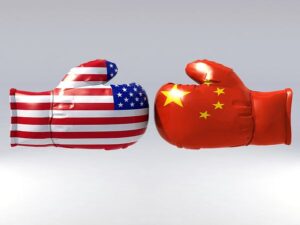
Pic: Courtesy The Diplomat
During the general debate on the 21 Sep 21, Speech by US and Chinese president was interesting.
Link to US president speech:
Link to Chinese president Speech:
http://www.news.cn/english/2021-09/22/c_1310201230.htm
Punches
Biden spoke about democracy and universal human rights, hinting at defending democracy and human rights from creeping authoritarianism.
Xi spoke only fleetingly of human rights through development and democracy as not a special right reserved to any individual country.
Xi used U.S. failure in Afghanistan as a counterpoint to global challenges emerging out of Covid-19 pandemic.
Xi’s message to developing countries is that China has emerged from deep poverty to the world’s second largest economy whereas, USA has been invading and fighting foreign wars.
Selling China
Xi prioritised economic development while decrying sovereignty-violating foreign military interventions.
Chinese President Xi Jinping’s speech constituted an explicit pitch to developing countries for a post-U.S. dominant world order hinged to China’s economic development model.
Xi laid out initiatives including international aid and debt relief for the needs of less-developed members of the U.N.
Common Denominators
Both leaders made specific commitments to address the global challenges of Covid-19 with pledges of vaccine doses to countries that lack them and financial support for the World Health Organization’s COVAX equitable vaccine supply initiative.
Climate change figured prominently in both speeches.
- Biden promised greater government funding for “green infrastructure and electric vehicles” and $11 billion in climate aid annually by 2024 to assist poorer countries vulnerable to extreme weather and rising temperatures.
- Xi announced that China will stop funding the construction of coal-fired power plants outside its borders.
Both leaders also spoke of the Afghanistan situation but with wildly different perspectives.
- Xi called Afghanistan situation as an event demonstrating that military intervention from the outside and so-called democratic transformation entail nothing but harm.
- Biden called the Afghanistan withdrawal a national turning point in a new era of relentless diplomacy.
Inferences: Another Cold War
Xi’s speech had no tone or content to ease the currently fraught U.S.-China relationship.
Messages from both the speeches indicate that there is very less chance of any meaningful reset in their bilateral relationship. The relationship seems to be heading towards a Cold War.
China is projecting itself as the alternative to the USA. China is presenting an alternative version of globalization, asking smaller countries to pick a side.
Bottom Line
Sumo Wrestling is going ON.
“When elephants fight, the grass gets trampled”
Question
Who in your opinion will win this bout?
Suggestions and value additions are most welcome
For regular updates, please register here
References:
https://www.politico.com/newsletters/politico-china-watcher/2020/05/15/welcome-to-politico-china-watcher-489237
http://www.news.cn/english/2021-09/22/c_1310201230.htm

